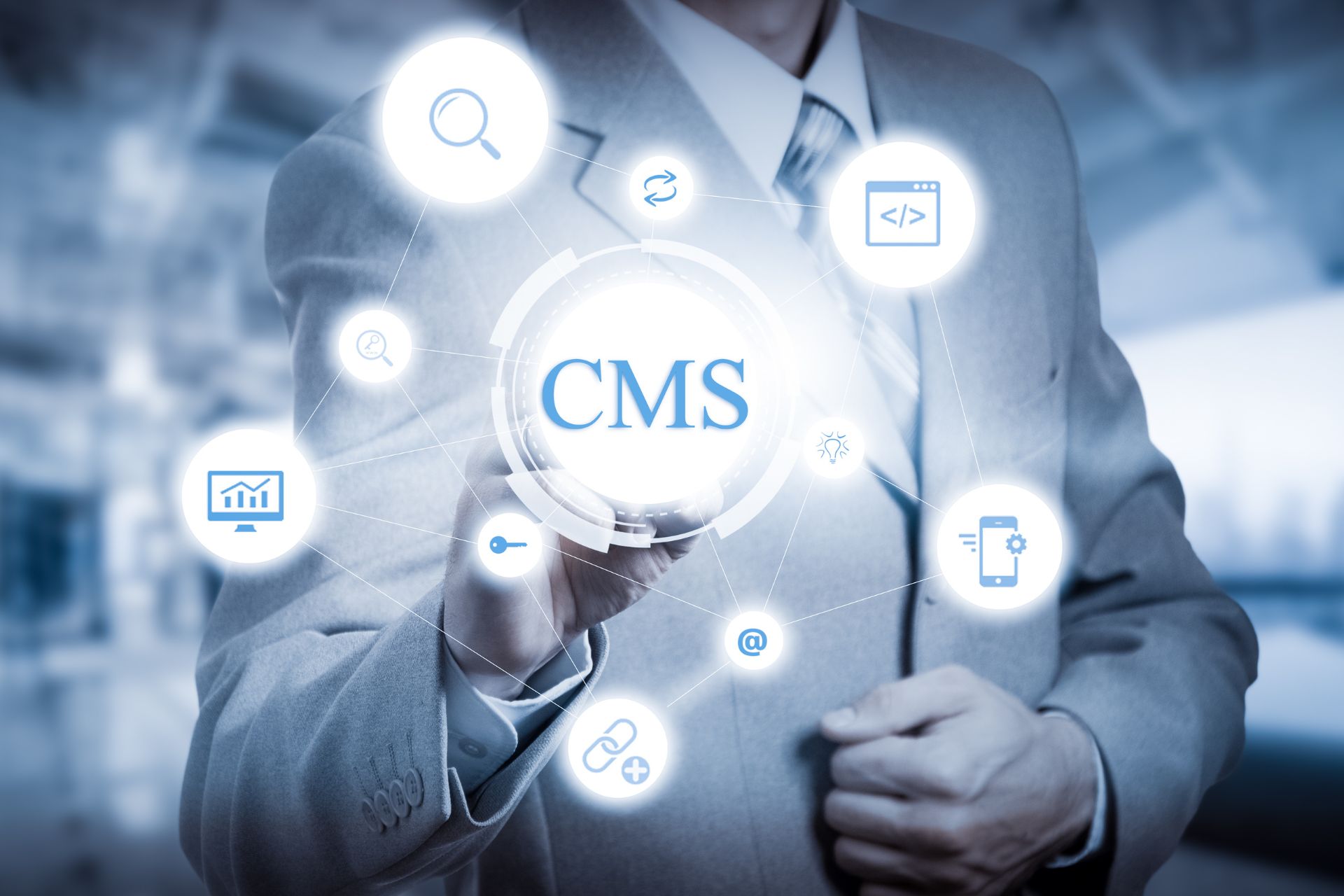AI-Powered CMS: The Next Evolution in Digital Experiences

The integration of Artificial Intelligence (AI) with Content Management Systems (CMS) is fundamentally transforming how businesses manage and personalize their content. AI-powered CMS platforms spearhead this transformation, significantly enhancing efficiency, personalization, and user engagement. This blog explores the substantial impact AI is having on CMS, detailing how AI is reshaping digital content management and what this means for the future of digital experiences.
Exploring the Impact of Artificial Intelligence on CMS
Artificial Intelligence (AI) and Content Management Systems (CMS) are crucial technologies driving the transformation of digital content management. AI, which simulates human intelligence, automates tasks such as learning, reasoning, problem-solving, and perception. CMS enables users to create, manage, and modify content easily, without needing technical skills. When these two technologies converge, they make a synergy that is revolutionizing digital content management.
As of 2024, over 40% of businesses are leveraging AI, and this number is expected to grow. AI in CMS can automate many manual tasks, such as sorting and categorizing content. While AI can generate content, maintaining the human touch is crucial to preserving the brand’s authenticity. AI-driven analytics also provide insights into audience preferences, ensuring that the right content reaches the right user, and enhancing personalization based on user behavior and preferences.
Benefits of AI-Powered CMS
In today's digital transformation era, incorporating AI into CMS has become essential. The positive impact of AI on CMS is significant, elevating the user experience considerably. Here's an in-depth look at these benefits:
1. Personalization: Tailoring the Digital Experience
AI-driven CMS can analyze user behavior, preferences, and past interactions to provide content that resonates with them. This personalized touch ensures every user feels valued, leading to higher engagement rates. AI can modify displayed content in real time to match ongoing user interests, making the experience more relevant and engaging.
2. Automation: Streamlining and Refining Processes
AI-powered CMS can automatically assign relevant tags to content, ensuring precise and consistent categorization. Instead of manually adjusting SEO parameters, AI can analyze search trends and optimize content to rank higher on search engines. Moreover, AI can ensure timely updates and remove outdated content, keeping the CMS current and efficient.
3. Enhanced Search: Making Discoverability Seamless
Traditional keyword-based searches can often miss the context. AI interprets user intent to deliver more accurate and relevant search results. With the rise of voice-activated devices, AI-driven CMS can optimize content for voice search, catering to a broader audience. AI can even search within images and videos, recognizing patterns, objects, and faces, making visual content more discoverable.
4. Content Recommendations: Guiding Users Through a Journey
By analyzing user navigation patterns, AI can predict and recommend content that the user might find interesting. Whether users switch from mobile to desktop or vice versa, AI ensures consistent content recommendations across all devices. This leads to longer user sessions, lower bounce rates, and higher retention.
How AI Improves CMS Efficiency and User Experience
AI accelerates content delivery through automated workflows and minimizing manual tasks. It enhances the user experience by delivering relevant, personalized content in real-time. Additionally, AI-powered chatbots improve user interactions, making the CMS more interactive and engaging.
Foundations of AI-Powered Content Management
In today’s digital era, the need for smart, adaptable, and efficient CMS is more significant than ever. With the increasing volume of content creation, managing this vast ocean of information requires sophisticated tools. Here are the foundational technologies transforming traditional CMS into intelligent, responsive systems:
1. Machine Learning Algorithms: Learning from Data
- Adaptive Content Delivery: Machine Learning (ML) models learn from user behavior over time and adapt content delivery to best suit individual preferences.
- Automated Categorization: ML algorithms automatically categorize content based on patterns and similarities, removing the manual labor of content sorting.
- Anomaly Detection: By recognizing patterns, ML can spot anomalies or irregularities in content, aiding in maintaining content quality.
2. Natural Language Processing (NLP): Understanding Human Language
- Semantic Analysis: NLP allows the CMS to understand the context behind the content, ensuring relevant categorization and tagging.
- Sentiment Analysis: By analyzing the sentiment behind user-generated content or feedback, CMS can gauge user reactions and feelings towards specific content.
- Language Translation: NLP enables real-time translation, making content accessible to a global audience without manual intervention.
3. Predictive Analytics: Anticipating Future Trends
- Content Recommendations: By analyzing past user behaviors and preferences, predictive models can forecast the type of content a user might be interested in next.
- Trend Forecasting: Predictive analytics can offer content creators valuable insights into upcoming trends, helping to keep the content timely and relevant.
- User Journey Optimization: Predictive analytics can anticipate user paths, enabling CMS to streamline content delivery for optimized user journeys.
Measuring AI-CMS Performance
Incorporating AI into a CMS offers numerous benefits, from personalization to automation. However, performance measurement is crucial to ensure this integration delivers on its promises. Here’s how you can monitor the effectiveness of an AI-driven CMS:
1. User Engagement Metrics
- Bounce Rate: A low bounce rate indicates visitors find the content relevant and continue to navigate the platform.
- Page Views Per Visit: An increased number of page views suggests users are engaging with more content.
- Returning vs. New Users: A growing number of returning users indicates successful AI-driven personalization.
2. Click-Through Rates (CTR)
- Content CTR: Measure the proportion of users who click on suggested content. An increased CTR suggests that AI recommendations are highly effective.
- Ad CTR: For monetized platforms, monitoring the CTR for ads provides insights into how effectively AI targets advertisements.
3. Time Spent on the Platform
- Average Session Duration: A longer session duration suggests that users find the content engaging and relevant.
- Time on Page: Track the time users spend on each piece of content to identify which topics or formats are most engaging.
4. A/B Testing for Personalization
- Personalization Variants: Test different AI-driven personalization strategies to see which performs best.
- Conversion Rate Optimization: Use A/B testing to see which personalized prompts or calls to action increase conversions.
5. Feedback and Sentiment Analysis
- User Surveys: Regularly collect feedback from users to assess their experiences with the CMS and the effectiveness of AI-generated content.
- Sentiment Analysis: Use AI to analyze comments, reviews, and feedback to gauge the overall sentiment towards the platform and its content.
6. System Performance Metrics
- Query Response Time: Evaluate the speed at which the AI-powered CMS retrieves and presents content.
- Error Rate: Track the frequency of incorrect content recommendations or mis-categorizations.
7. ROI and Business Impact Metrics
- Cost Savings: Determine the reduction in operational expenses due to the automation capabilities of AI in content management.
- Revenue Growth: Monitor any revenue growth directly attributed to improved user experience and engagement due to AI integration.
Future Directions of AI in Content Management
What does the future hold for AI-powered CMS?
- Hyper-Personalization: Delivering highly tailored user experiences based on intricate details.
- Real-Time Content Adaptation: Dynamically updating content in response to real-time user behavior.
- Intuitive UI/UX Design: Crafting user interfaces and experiences that adapt to individual needs through AI.
Harnessing AI-Powered CMS for Future-Proof Digital Experiences
Adopting AI in CMS brings a new era of efficiency and personalization to digital content. By integrating these advanced technologies, businesses can remain competitive in the digital age, providing content that captivates, engages, and inspires action. The future of content management is now, and it's driven by AI.
Discover cutting-edge insights, proven strategies, and real-world examples in AI-powered CMS. Enhance your digital content management with our expert guides and stay at the forefront of technological advancements.




